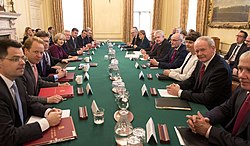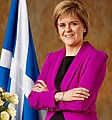Joint Ministerial Committee (UK)
 British Prime Minister chairs a Joint Ministerial Committee meeting at 10 Downing Street | |
| Formation | July 1, 1999[1] |
|---|---|
| Type | Governmental organisation |
| Purpose | Relationship between governments of the United Kingdom |
| Location |
|
Membership | 4; |
Chair | Boris Johnson |
Key people | Nicola Sturgeon, First Minister of Scotland Mark Drakeford, First Minister of Wales Paul Givan and Michelle O'Neill, First Minister and deputy First Minister of Northern Ireland |
Main organ | UK Government Scottish Government Welsh Government Northern Ireland Executive |
| Website | GOV.UK (Cabinet Office): Intergovernmental Relations |
| This article is part of a series on |
| Politics of the United Kingdom |
|---|
 |
|
In the United Kingdom, the Joint Ministerial Committee (JMC), (Welsh: Y Cyd-bwyllgor Gweinidogion), is a consultative body established by a memorandum of understanding between the UK Government and devolved administrations in Scotland, Wales and Northern Ireland. It was created in 1999 by Tony Blair's Labour government.[1] The JMC seeks to act as a focus for the coordination of the relationships between these administrations.
The terms of reference for the JMC are:[2]
- To consider non-devolved matters which impinge on devolved responsibilities, and devolved matters which impinge on non-devolved responsibilities.
- Where the UK government and the devolved administrations so agree, to consider devolved matters if it is beneficial to discuss their respective treatment in different parts of the UK.
- To keep the arrangements for liaison between the UK government and the devolved administrations under review.
- To consider disputes between the administrations.
Since its creation in 1999, there have been several different JMC meeting formats.[1] Since 2010, there have been four types: plenary, Europe, domestic and European negotiations (created following the 2016 United Kingdom European Union membership referendum[3][4]).
Membership[]
The current membership of the JMC Plenary (JMC(P)) is as follows:
- Boris Johnson, Prime Minister, who acts as chair of the JMC.
- Stephen Barclay, Chancellor of the Duchy of Lancaster and Minister for the Cabinet Office
- Nicola Sturgeon, First Minister of Scotland
- Mark Drakeford, First Minister of Wales
- Paul Givan and Michelle O'Neill, First Minister and deputy First Minister of Northern Ireland
The following may also attend sessions of the JMC:
- Deputy Prime Minister of the United Kingdom or First Secretary of State (if in office)
- The Secretary of State for Foreign and Commonwealth Affairs
- The secretaries of state for Scotland, Wales and Northern Ireland.
- Other Secretaries of State when issues relating to their remit are discussed.
Current members[]

 United Kingdom
United Kingdom
Stephen Barclay,
Chancellor of the Duchy of Lancaster
Minister for the Cabinet Office
 Scotland
Scotland
Nicola Sturgeon,
First Minister of Scotland
 Wales
Wales
Mark Drakeford,
First Minister of Wales
 Northern Ireland
Northern Ireland
Paul Givan,
First Minister of Northern Ireland
 Northern Ireland
Northern Ireland
Michelle O'Neill,
deputy First Minister of Northern Ireland
Meetings[]
This section needs to be updated. (October 2020) |
The JMC Plenary meetings were intended to occur at least once every year. However, no plenary meetings were held between 2002 and 2008.[1] This was primarily because the UK, Scotland, and Wales governments were all controlled by the Labour Party, and as such ministers from the central and devolved governments could quickly and easily use informal links to coordinate policy.[5] However, following the Scottish National Party's victory at the 2007 Scottish Parliament election this was no longer the case. So JMC Plenary meetings were re-established, though on an ad hoc basis.[1]
Under proposals outlined by Theresa May in October 2016, the JMC Plenary was to meet on a definite annual basis and would have rotated between London, Edinburgh, Cardiff and Belfast. It would have also published an annual report on its work and hoped to foster greater formal and informal links between ministers from each (devolved) government.[6][7] However, these proposals were vetoed by Sinn Féin's Martin McGuinness.[6]
The most recent JMC Plenary was convened by Theresa May on 19 December 2018. Soon after he became Prime Minister in July 2019, Boris Johnson announced he intended to hold a JMC Plenary meeting as soon as possible.[8] However, he is yet to call one.
See also[]
- Council of Australian Governments, a similar body in Australia
- First Ministers' conference and the Council of the Federation, similar bodies in Canada
- National Governors Association, a similar body in the United States of America
- North/South Ministerial Council
- British–Irish Council, which includes the British and Irish Governments, the UK Devolved Administrations and the Crown Dependencies.
References[]
- ^ a b c d e "Devolution: Joint Ministerial Committee | The Institute for Government". www.instituteforgovernment.org.uk.
- ^ "Devolution of powers to Scotland, Wales and Northern Ireland". GOV.UK.
- ^ "Joint Ministerial Committee (Plenary) communiqué: 30 January 2017". GOV.UK.
- ^ "Brexit: DUP and Sinn Féin attend Theresa May meeting". BBC News. Retrieved 30 January 2017.
- ^ June Burnham, Fragmentation and Central Control: Competing Forces in a Disunited Kingdom. In Jose Ruano and Marius Profiroiu (ed.), The Palgrave Handbook of Decentralisation in Europe, 2017, ISBN 978-3-319-32437-1, p. 144
- ^ a b "Union at the Crossroads: Can the British state handle the challenges of devolution? by Michael Kenny, Philip Rycroft and Jack Sheldon". The Constitution Society. 12 April 2021.
- ^ "Theresa May calls for 'grown-up' UK and Wales relations". 23 October 2016 – via www.bbc.co.uk.
- ^ "PM meeting with First Minister Nicola Sturgeon: 29 July 2019". 29 July 2019.
External links[]
- Devolution in the United Kingdom
- 1999 establishments in the United Kingdom




